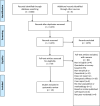Psychedelic Treatments for Psychiatric Disorders: A Systematic Review and Thematic Synthesis of Patient Experiences in Qualitative Studies
- PMID: 32803732
- PMCID: PMC7447679
- DOI: 10.1007/s40263-020-00748-y
Psychedelic Treatments for Psychiatric Disorders: A Systematic Review and Thematic Synthesis of Patient Experiences in Qualitative Studies
Abstract
Introduction: Interest in the use of psychedelic substances for the treatment of mental disorders is increasing. Processes that may affect therapeutic change are not yet fully understood. Qualitative research methods are increasingly used to examine patient accounts; however, currently, no systematic review exists that synthesizes these findings in relation to the use of psychedelics for the treatment of mental disorders.
Objective: To provide an overview of salient themes in patient experiences of psychedelic treatments for mental disorders, presenting both common and diverging elements in patients' accounts, and elucidating how these affect the treatment process.
Methods: We systematically searched the PubMed, MEDLINE, PsycINFO, and Embase databases for English-language qualitative literature without time limitations. Inclusion criteria were qualitative research design; peer-reviewed studies; based on verbalized patient utterances; and a level of abstraction or analysis of the results. Thematic synthesis was used to analyze and synthesize results across studies. A critical appraisal of study quality and methodological rigor was conducted using the Critical Appraisal Skills Programme (CASP).
Results: Fifteen research articles, comprising 178 patient experiences, were included. Studies exhibited a broad heterogeneity in terms of substance, mental disorder, treatment context, and qualitative methodology. Substances included psilocybin, lysergic acid diethylamide (LSD), ibogaine, ayahuasca, ketamine and 3,4-methylenedioxymethamphetamine (MDMA). Disorders included anxiety, depression, eating disorders, post-traumatic stress disorder, and substance use disorders. While the included compounds were heterogeneous in pharmacology and treatment contexts, patients reported largely comparable experiences across disorders, which included phenomenological analogous effects, perspectives on the intervention, therapeutic processes and treatment outcomes. Comparable therapeutic processes included insights, altered self-perception, increased connectedness, transcendental experiences, and an expanded emotional spectrum, which patients reported contributed to clinically and personally relevant responses.
Conclusions: This review demonstrates how qualitative research of psychedelic treatments can contribute to distinguishing specific features of specific substances, and carry otherwise undiscovered implications for the treatment of specific psychiatric disorders.
Conflict of interest statement
Robert A. Schoevers received a research grant from the Netherlands Organization Health Research and Development for a clinical study on oral esketamine, and is the co-investigator of a clinical study on psilocybin funded by Compass Pathways. He has also received an educational grant from Janssen, Pharmaceutical Companies of Johnson and Johnson, and honorarium from Clexio Biosciences. Eric Vermetten is the principal investigator of a clinical trial on MDMA funded by the Multidisciplinary Association for Psychedelic Studies. Joost J. Breeksema, Alistair R. Niemeijer and Erwin Krediet declare no conflicts of interest.
References
-
- Bogenschutz MP, Forcehimes AA, Pommy JA, Wilcox CE, Barbosa PCR, Strassman RJ. Psilocybin-assisted treatment for alcohol dependence: a proof-of-concept study. J Psychopharmacol. 2015;29(3):289–299. - PubMed
-
- Krupitsky EM, Grinenko AY. Ketamine psychedelic therapy (KPT): a review of the results of ten years of research. J Psychoactive Drugs. 1997;29(2):165–183. - PubMed
-
- Oehen P, Traber R, Widmer V, Schnyder U. A randomized, controlled pilot study of MDMA (3,4-Methylenedioxymethamphetamine)-assisted psychotherapy for treatment of resistant, chronic Post-Traumatic Stress Disorder (PTSD) J Psychopharmacol. 2013;27(1):40–52. - PubMed
Publication types
MeSH terms
Substances
LinkOut - more resources
Full Text Sources
Medical


